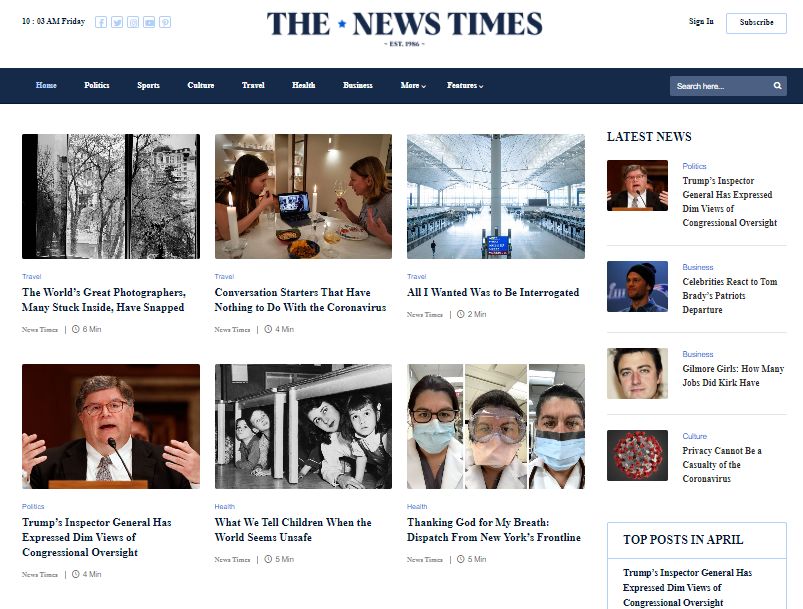The Significance of Fact-Checking in the World of News Online
The frequency of misinformation in today's on the internet news landscape has actually gotten to disconcerting degrees. Fact-checking companies play an important role in neutralizing this pattern. They confirm insurance claims and enhance the credibility of journalism. Nevertheless, the efficiency of these companies usually rests on their methods and public assumption. As audiences browse this complex atmosphere, the ramifications of their searchings for might form the future of news intake and depend on. What does this mean for the honesty of details relocating onward?

The Increase of Misinformation in the Digital Age
How has the advent of electronic innovation added to the spread of misinformation? The rapid development of the net and social media systems has helped with the circulation of details at an unprecedented rate. Customers can share articles, videos, and point of views with a simple click, frequently without confirming the web content's accuracy. Formulas prioritize sensational or mentally billed product, leading to an expansion of misleading narratives that record focus.
Additionally, the anonymity afforded by digital systems permits people to spread out false details without accountability (stnews.live). False information grows in resemble chambers, where customers are subjected primarily to point of views that reinforce their beliefs, additionally setting falsehoods. The saturation of information can overwhelm individuals, making it challenging to recognize credible resources from undependable ones. Consequently, false information has come to be a pervasive concern in the electronic landscape, influencing popular opinion and trust in genuine news sources
The Duty of Fact-Checking Organizations
Fact-checking organizations play a vital function in improving the integrity of journalism by confirming insurance claims made in report. Their efforts are important in combating misinformation, ensuring that precise information dominates in the electronic landscape. By holding media outlets responsible, these organizations contribute considerably to educated public discussion.
Enhancing Reliability in Journalism
While misinformation multiplies in the digital age, fact-checking organizations play a crucial role in improving the reputation of journalism. These organizations carefully verify cases made in news write-ups, public statements, and social networks posts, guaranteeing that information shared to the public is exact and credible. By supplying independent analyses, they function as an essential source for reporters, helping them keep high standards of honesty. Additionally, their efforts advertise openness in media, promoting public count on. As target markets end up being progressively discerning, the presence of credible fact-checking entities can identify trustworthy news resources from those that may spread out fallacies. Inevitably, the commitment of fact-checking companies to support reliability is crucial for the health of autonomous discussion.
Combating False Information Properly
As misinformation proceeds to spread out swiftly across electronic platforms, the role of fact-checking organizations becomes significantly vital in the battle for precise details. These organizations work as watchdogs, looking at insurance claims made by somebodies and media outlets to ensure responsibility. By employing extensive research study approaches and expert analysis, they validate realities and clarify misleading narratives. Their searchings for are distributed via various channels, informing the public and fostering critical reasoning. On top of that, partnerships with social media platforms boost their reach, enabling prompt flagging of false information. As digital literacy grows, the influence of fact-checking organizations is vital in equipping audiences to discern reality from fraud, ultimately adding to an extra educated society.
Exactly How False Information Affects Public Perception
Misinformation greatly threatens rely on media, leading target markets to wonder about the integrity of news resources. As a result, people typically move towards outlets that reinforce their existing beliefs, adding to the polarization of viewpoints. This vibrant develops a fragmented information landscape, where shared comprehending comes to be increasingly challenging to accomplish.
Trust in Media

Count on media has come to be increasingly fragile in the digital age, where the fast spread of false details can alter public assumption. As false information multiplies throughout social media sites and on the internet systems, audiences commonly discover it challenging to recognize reliable resources from unstable ones. This uncertainty cultivates hesitation, leading lots of people to examine the motives behind news coverage. Consequently, count on established media electrical outlets has actually decreased, as customers progressively transform to alternate resources that may do not have rigorous editorial requirements. This disintegration of trust not only influences specific beliefs yet additionally undermines the collective capability to involve in notified discussions. Inevitably, the integrity of journalism goes to risk, highlighting the critical demand for efficient fact-checking to bring back confidence in the media landscape.

Polarization of Viewpoints
The raising suspicion toward standard media has actually added to a growing polarization of opinions amongst the public. Misinformation, typically shared through social networks and on the internet platforms, plays a significant function fit unique ideological divides. People regularly look for information that aligns with their pre-existing ideas, enhancing their point of views while rejecting opposing point of views. This echo chamber effect magnifies divisions, leading to a fragmented public discourse where agreement becomes progressively elusive. In addition, sensationalized stories thrive in this atmosphere, even more skewing public perception and cultivating question in credible resources. As polarization intensifies, the requirement for efficient fact-checking comes to be extremely important to bridge gaps and promote notified conversations, eventually making sure an extra natural culture with the ability of maneuvering intricate concerns.
Strategies for Reliable Fact-Checking
Reliable fact-checking depends on a methodical approach that consists of thorough study, confirmation of sources, and important evaluation of insurance claims. A foundational method is cross-referencing information from numerous trustworthy resources to confirm its precision. Fact-checkers often use specialized data sources and archives to trace the beginning of certain declarations, guaranteeing that the reported details aligns with documented proof.
Another essential approach includes scrutinizing the context in which claims exist. Misleading information can emerge his comment is here from out-of-context quotations or selective information use. By this website taking a look at the more comprehensive narrative, fact-checkers can recognize potential biases or false impressions.
Moreover, involving with specialists in relevant fields can provide clarity and insight that improves the fact-checking procedure. This cooperation can discover nuances that laypeople may neglect - stnews.live. Inevitably, a disciplined method integrating these techniques fosters a more informed public, enhancing the dependability of info distributed in the digital age
The Influence of Social Media on News Usage
Exactly how has social networks transformed the way individuals consume news? The development of platforms like Facebook, Twitter, and Instagram has notably modified news consumption patterns. News is currently shared swiftly, enabling customers to accessibility real-time updates and involve with material through sort, shares, and remarks. This immediacy has actually cultivated a preference for bite-sized information, frequently at the expense of thorough analysis.
Social media makes it possible for individualized news feeds, where formulas curate content based on customer preferences, creating resemble chambers that may limit exposure to diverse viewpoints. The role of conventional news outlets has decreased as individuals increasingly rely upon peer suggestions and trending topics. Consequently, the integrity of details is usually jeopardized, as sensationalism can overshadow accurate coverage. Overall, social networks has actually reshaped news intake, emphasizing speed and personalization while challenging the standards of journalistic integrity.
Encouraging Target Markets to Determine Trustworthy Resources

Additionally, checking out the authorship and organizational history of newspaper article can disclose prospective predispositions. Cross-referencing info across multiple trustworthy electrical outlets even more improves the verification procedure. Using digital devices, such as browser expansions that rank the trustworthiness of sites, can also aid in determining credible information. By click reference proactively involving with these sources and growing a crucial state of mind, audiences can much better equip themselves to recognize reputable news sources, eventually promoting a more educated society in the middle of the complexities these days's media atmosphere.
The Future of Journalism and Fact-Checking
As the media landscape develops, the future of journalism and fact-checking deals with both tests and chances. The increase of electronic platforms has democratized information dissemination, allowing varied voices to arise. This has actually additionally led to the proliferation of false information, demanding durable fact-checking devices. Journalists will progressively depend on technology, including AI devices, to validate truths rapidly and successfully.
Partnership between news companies and fact-checking entities is expected to enhance trustworthiness and transparency. Moreover, audience engagement will certainly play an important function, as notified viewers become significant partners in determining reliable content.
The demand for responsibility and precision is likely to expand, pushing reporters to support high requirements in their reporting. Inevitably, the future of journalism might rest on its capacity to adjust to technical developments while preserving journalistic integrity, making certain that fact-checking stays a keystone of qualified news.
Frequently Asked Inquiries
How Can I Report False Information I Encounter Online?
To report false information encountered online, individuals can use platform-specific coverage devices, offer clear proof, and share the information with fact-checking organizations. Engaging with community discussions can also aid elevate recognition concerning the false information.
What Prevail Indications of Misinformation in News Articles?
Usual indications of false information in newspaper article consist of marvelous headings, absence of qualified resources, psychological language, inconsistent facts, and absence of author qualifications. Readers should seriously examine web content for these indicators to recognize accuracy.
How Do Fact-Checkers Verify Resources?
Fact-checkers verify sources by cross-referencing details with credible databases, speaking with professionals, and taking a look at the original context of insurance claims. They also examine the reliability of the resources, ensuring accurate and trustworthy info for public consumption.
What Legal Activities Can Be Taken Against False information?
Legal activities against false information might include libel claims, cease-and-desist orders, and governing fines. Victims can prosecute through civil courts, while some territories enforce fines or permissions on platforms disseminating false information.
Are There Apps for Fact-Checking News On-The-Go?
Numerous applications exist for fact-checking news on-the-go, including Snopes, FactCheck.org, and PolitiFact. These applications help customers validate insurance claims quickly, advertising informed decision-making and cultivating a much more discerning approach to consuming news in real-time.